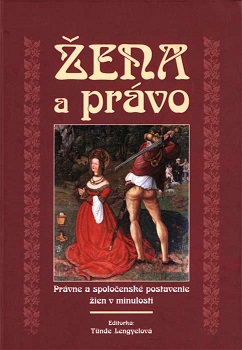Žena v pramenech osobní povahy v 17. století
Women in Autobiographical Sources of the 17th Century
Author(s): Josef Hrdlička
Subject(s): Gender Studies, History of Law, Culture and social structure , Family and social welfare, 17th Century
Published by: SAV - Slovenská akadémia vied - Historický ústav SAV
Keywords: autobiographical sources; women; 17th century;
Summary/Abstract: Great number of preserved documents concerning women's history has the disadvantage of being written by men. As a result, women are depicted through the male point of view and experience. Therefore, it is not possible to study history focused exclusively on women, but only history of women in its social context. The author studies position of women based on documents, which in Czech historiography have been termed, though not quite adequately, as sources of autobiographical statements (prameny osobni povahy). It is an equivalent of German Selbstzeugnisse or more modern synonym Ego-Dokumenten. They are documents of autobiographical character with great informative value about mentality of their authors. Usually, there are three kinds of these personal sources: diaries, autobiographies and memoirs. In broader sense travelogues, correspondence, albums, scrapbooks and chronicles can be included into the category. From the end of the 16th century, lives of lower nobility started to be increasingly influenced by bureaucratisation. The obligation to stay in an office for a longer time influenced carriers of men, who owned manors. Manor administration was taken over by their wives. Despite the fact that these women were familiar with the basics of manor management, they unexpectedly encounte¬red resistance of their own subjects. It was impossible to root out the notion that their master does not necessarily have to be a man out or the traditional peasants’ mentality. However, such an idea was not foreign to the minds of the lower noblewomen either. They blamed their husbands for ridicule they were treated with by their subjects and servants. In their letters, wives urged their husbands, though in vain, to end their carrier as officials and return home to consolidate family and property matters. In comparison with the lower noblewomen living on small estates and manors, aristocratic noblewomen had to face another potential source of resistance. It was an estate office, the admi¬nistrative centre of their manor house and estates. Estate administrators had their own agenda and aims, often different from plans of the landlord’s wife. Family chronicles, containing usually short and concise records about rites of passage of the family represent valuable sources of autobiographical statement. Family chronicles reveal a lot about position of women, particularly about private sphere of their lives. They include informa¬tion about events traditionally associated with women’s lives such as weddings and childbearing. Private correspondence, family chronicles or notes added to printed economic calendars are full of records that reflected maternal role of a woman and her function of carrying on the family line. From the last quarter of the 17thcentury, aristocratic women, even though not necessarily from the families active in politics in the Czech kingdom, showed an increasing awareness of their belonging to their own family and participated in writing family records for their children and other future descendants.
Book: Žena a právo. Právne a spoločenské postavenie žien v minulosti
- Page Range: 153-163
- Page Count: 11
- Publication Year: 2004
- Language: Slovak
- Content File-PDF

